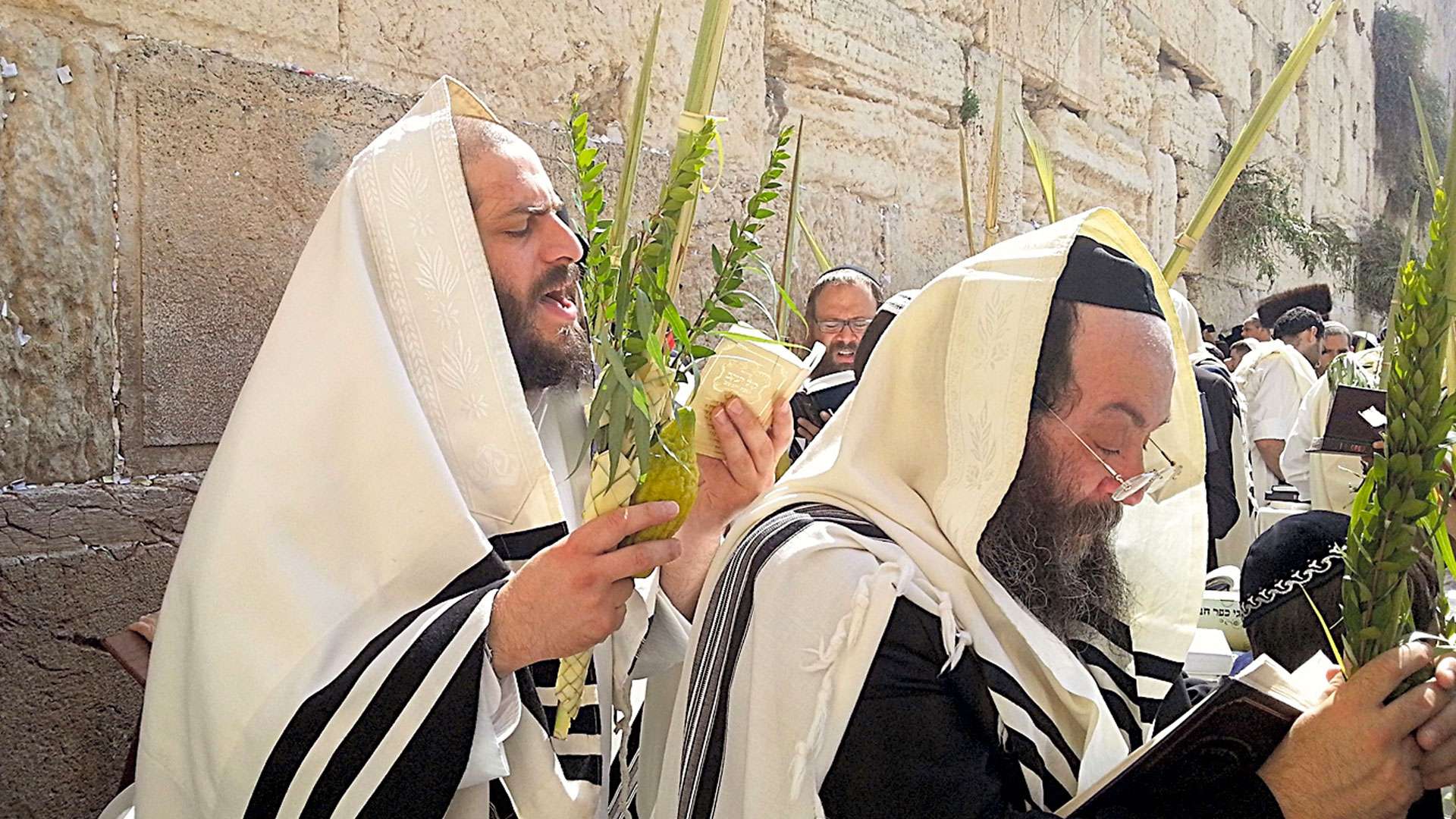An interesting and powerfully symbolic aspect of the celebration of the Feast of Tabernacles—Sukkot—which will be celebrated this year from the evening of 20 September to the evening of 27 September, relates to the lulav. The Jew is commanded to take four plants and wave them before the Lord. Leviticus 23:40 says: “On the first day you are to take choice fruit from the trees, and palm fronds, leafy branches and poplars, and rejoice before the Lord your God for seven days.”
The four plants in question are the citron, or etrog, a citrus fruit native to Israel that smells like a lemon, and the branches of three other plants—the palm, the willow and the myrtle—which are tied together and known as the lulav. It is interesting to note that the colours of the feast are green and gold, the colours of the palm fronds and the citron. Something to think about as Australians!
With these four plants, or “species”, in hand, the lulav is waved in every direction (up and down, and north, east, south and west)—a reminder to the worshipper that God is everywhere. There are times in our lives when we really do need the reassurance that God is there for us, and there is no better way to reaffirm that than in offering up praise to the Lord.
Sometimes—let us be honest!—we don’t feel like praising the Lord. Circumstances overwhelm us. Life seems unfair. At such times, we need to be intentional and choose to praise the Lord, simply because He is who He is—and Tabernacles, as we are seeing, is a wonderful reminder of His awesome character.
Choose to praise the Lord, too, because you were created to praise Him. Psalm 103 is a well-known example of a call to praise, the psalmist addressing himself and as it were telling himself to “Praise the Lord!” All because of who God is and what He has done. Listen to the opening verses:
“Praise the Lord, O my soul; all my inmost being, praise His holy name. Praise the Lord, O my soul, and forget not all His benefits—who forgives all your sins and heals all your diseases, who redeems your life from the pit and crowns you with love and compassion, who satisfies your desires with good things so that your youth is renewed like the eagle’s.”
Actually, I discovered that one of the times when the lulav is waved is during the singing of Psalm 118, one of the “Hallel Psalms” sung at all the great Jewish feasts. That is quite something, really, because the central chapter in the Bible is Psalm 118, found between the shortest chapter (Psalm 117) and the longest (Psalm 119).
I haven’t finished yet! There are 594 chapters before Psalm 118 and 594 chapters after it. Add these up and you get…. 1188. Now the centre verse in the whole Bible is…. Psalm 118:8! What does that verse say?—“It is better to take refuge in the Lord than to trust in man.” You want to be in the centre of God’s will? Go to the centre of His Word!
Personally I am not much into Bible numerics, but all that is pretty amazing! Someone once sent me a beautiful PowerPoint presentation of this with some absolutely delightful photographs of the awesomeness of God’s creation. In that presentation were the following words, and the Feast of Tabernacles brings out the truth of these words:
When things get tough, always remember—faith doesn’t get you around trouble, it gets you through it! When you relinquish the desire to control your future, you obtain happiness. Think about it!
Now Jewish tradition offers us some interesting insights into the lulav and citron, in effect challenging us as Christians to honour the Lord with our lives and to give back to Him out of His blessing and provision to us. And an important way we do that is by giving ourselves in sacrificial service to others, something I have referred to earlier in this Tabernacles series.
Let us look for a moment at these four plants. As we do so, think of “fruit” as deeds of love and service to others, that which flows from our lives to others. In John 15:8 Jesus said to His disciples: “This is to My Father’s glory, that you bear much fruit, showing yourselves to be My disciples.” A challenging definition of a disciple!
And then think of sweet “fragrance” as representative of our spiritual lives—getting into God’s Word, knowing how to use it, praying, and having a sweetness that comes from spending time in the presence of the Lord.
Now the palm has no fragrance but bears a sweet fruit, the date. It speaks to us of someone who is keen to do what is right, to help others, to living according to the dictates of the Word of God, but sadly there is somehow little of the sweet spirit that comes from spending time with the Lord. Before long legalism takes root.
The myrtle is the complete reverse—beautifully fragrant but no fruit. It has been said by many that this speaks to us of those who are “so heavenly minded that they are no earthly good.” They do the “right” spiritual things, but somehow have left compassion and practical love and Christian care gathering dust on the shelf. “That’s for the Marthas of this world,” they think… and sometimes say.
Now to the willow, which may look attractive (I guess that depends upon your taste in trees!) but sadly it has neither fruit nor fragrance. Such people have little spiritual depth, only a nodding acquaintance with the Bible, and are what some have described as a pastor’s nightmare! They are “high maintenance, low impact” people who have no real foundation as Christians and produce no fruit in their lives.
The citron represents—I hope!—everyone reading this. It is a sweet-smelling fruit that is said to represent the heart—because of its shape—and speaks of a balanced and wise life that is grounded in God’s Word and characterised by an intimate relationship with the Lord. The fruit and outflow of such a life is that of compassionate service to others. Is that you?
Now this picks up the important aspect of the sacrifices laid down as an integral part of the Feast of Tabernacles. We find in Numbers 29:12-40 a full description of these sacrifices. It is pretty clear from this description that bringing many sacrifices every day during Sukkot was for the Israelites a costly, time-consuming and even messy business.
Praise God that Jesus has fulfilled all of the many sacrificial requirements of the Old Testament! Hebrews 9:28 makes this abundantly clear. After making mention of the blood of bulls and goats, the writer goes on to declare, “How much more, then, will the blood of Christ, who through the eternal Spirit offered Himself unblemished to God, cleanse our consciences from acts that lead to death, so that we may serve the living God!”
Then in Hebrews 9:25,26,28 the writer as it were rams home the contrast: “Nor did He enter heaven to offer himself again and again, the way the high priest enters the Most Holy Place every year with blood that is not his own… Christ…. has appeared once for all at the end of the ages to do away with sin by the sacrifice of Himself… Christ was sacrificed once to take away the sins of many people.”
We are once and for all cleansed from our sin through the blood of Jesus! Christian believer—never forget that! But just as the Old Testament worshipper of God was required to show obedience and faith in bringing the sacrifices required, Christian believers, for whom the ultimate sacrifice has once and for all been paid, dare not ignore the New Testament call to sacrificial living.
Says Paul in Romans 12:1—“Therefore, I urge you, brothers, in view of God’s mercy, to offer your bodies as living sacrifices, holy and pleasing to God—this is your spiritual act of worship.” This means offering our very lives back to God in obedient and self-sacrificing service. For our lives are no longer our own—we belong to the Lord!
Quite simply, if our faith does not result in fruit, in deeds of faith, then it is not true, biblical, saving faith. Jesus by His Spirit dwells within the heart of every true believer, and though changes may come slowly in some of us, come they do!
Remember how Paul puts it in Ephesians 2:8-10—“For it is by grace you have been saved, through faith—and this not from yourselves, it is the gift of God—not by works, so that no one can boast. For we are God’s workmanship, created in Christ Jesus to do good works [fruit], which God prepared in advance for us to do.”
Are you bearing fruit that pleases and honours the Lord? Can others tell that you are a true disciple of Jesus? Is your worship characterised by a practical remembrance of those who are struggling in life? These are important, relevant and very biblically based questions for us all, if we want our faith to be real.
Remember the words of James 2:14-16—“What good is it, my brothers, if a man claims to have faith but has no deeds? Can such faith save him? Suppose a brother or sister is without clothes and daily food. If one of you says to him, “Go, I wish you well; keep warm and well fed,” but does nothing about his physical needs, what good is it? In the same way, faith by itself, if it is not accompanied by action, is dead.”
It is interesting to note that those who participated in the celebration of Tabernacles would bring an offering of fruit from their harvest to share with the less fortunate. This feast is more than just celebrating the goodness and faithfulness of God. The sacrifices, lulav and citron speak of sweet lives of compassion. Fruitful faith!
Even as we rejoice in the blessings of our God towards us, may we as biblical Christian believers receive afresh the reminder from Archbishop William Temple that “the Christian church is the one organisation in the world that exists purely for the benefit of non-members.” Think about it!












0 Comments